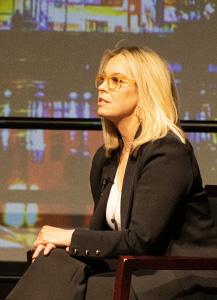
7 minute read
Mayor Schieve Aims to Inspire Young Minds, Visits UNR
By Nick Stewart and Jaedyn Young
Hillary Schieve, the mayor of Reno, visited the University of Nevada, Reno campus for a moderated discussion on Sept. 21. The mayor talked to students about her work in mental health, public safety, affordable housing, LGBTQ+ rights, Truckee River improvements and greater student involvement in city conversations.
Advertisement
The Associated Students of University of Nevada Department of Government Affairs hosted Schieve’s talk as a part of their Wolf Pack Talks series to increase student political activity by bringing student representatives in the political world to campus.
Schieve explained how important it was to visit the university and have university students in the conversation. In an anecdote about the beginning of her time as mayor, Schieve explained that Madeline Burak, the current legislative director for the office of Joe Lombardo, was a student at the university when chosen as Schieve’s first chief of staff.
“I really wanted to send a message to the university and to all of you future mayors out there,” Schieve said. “It’s important that, I think locally, we get engaged with our student government and show them that there’s nothing special about me, that you can do it. And so I literally plucked her right out of here and made her my chief of staff.”
Throughout the conversation, Schieve said she saw “future mayors” among all the students in the crowd, excited to see more become more involved in the political world.
“I think it’s really, really critical to have your voices at the table,” said Schieve. “And now more than ever, you guys are our future. Like I said, my future mayors, hopefully future presidents. And so I’m excited to work on that next year, because I think you guys are playing a bigger role than ever before.” Schieve said.
Future student politicians
When asked about what her path in politics had been like, Schieve explained how she became an “accidental mayor.” Schieve ran with little to no political background because she didn’t feel any of the candidates resonated with her during their campaigns, and she wanted to bring change to the city.

Even when she was part of the process of building up the Midtown district, she received little help from the city council at the time, which inspired her to become a bigger part of the city’s politics.
Now, she says she often feels the invasion of imposter syndrome questioning whether she can really do what she does; she speak of often being criticized in the public eye, with people telling her what to do. She says “I finally got very comfortable inside my skin.”
Affordable housing
Liesel Kemmelmeier, assistant director of ASUN’s department of government affairs and a moderator in the discussion, emphasized that house security and affordable housing were at the top of the list of financial priorities for students. Kemmelmeier asked what approach the city council was taking on this issue to combat the lack of affordable housing for students and others.
Schieve’s initial response criticized the cost of housing, particularly for students.
“It’s really outrageous because you’re trying to go to school, get an education, and I think many of you are also working.” Schieve said.
When talking about ways to bring in more housing, Schieve was disappointed that corporations with a large presence in the area such as Tesla were not more involved.
“When Tesla came to town, I was not elected at the time. That was just right before I got elected, and I think there should have been a really big conversation on the subsidies they received and that they were required to bring in housing,” Schieve said. “I think we missed the mark on having that conversation. I mean, it just seemed like a no-brainer, but it wasn’t.”
Some of the steps Schieve has taken included initiatives like the Sage Street Project, which constructed over 14,000 units of housing in the last six years.
National level Dawson Deal, director of government affairs for ASUN and a moderator for the discussion, highlighted Schieve’s work in Washington D.C. in recent years. Deal was interested in what Schieve’s work looked like in Washington and how it related to her work locally.
Schieve underscored her focus on mental health. She talked with several other mayors and worked
Reno 24/7 mental health
Hillary Schieve, the mayor of Reno gave a moderated discussion about her advocacy for mental health, affordable housing and public safety. She also hosted a live question and answer session and a meet and greet in the Joe Crowley Student Union’s Milt Glick Ballrooms on Sept. 21. The discussion was part of the Associated Students of UNR’s Department of Government Affairs’ Wolf Pack Talks.
Mental health is one of Schieve’s most prominent campaign goals. Schieve shed some light on why it was so important, especially for young adults and college students.
“Forty-nine percent of people ages 18 to 24, right now … in the United States are saying that they’re experiencing anxiety and depression,” Schieve said. “[And yet] mental health comes with such a massive stigma, and people do not want to talk about it to this extent.”
Schieve always had plans of building a mental health 24/7 crisis center, and after seven years of work, the plan is well underway.
“When I talk about the red tape, it’s totally real, unfortunately. But it’s been seven years since I’ve been working with the state and the county to provide a 24/7 mental health crisis center because our [emergency rooms] are not equipped to handle the crisis,” Schieve said. “That’s where you fix broken bones, not broken brains.”
The idea came from Arizona’s Crisis System, which is nationally recognized for its success in offering 24/7 mobile teams with mental health training and even local crisis telephone lines. Schieve said they wanted to take this successful idea and adapt it to the city of Reno.
Schieve said Steve Sisolak, the previous governor of Nevada, donated the building for the crisis center and Joe Lombardo, the current governor of Nevada is finishing that process off. She explained other agencies, like nonprofits, are working in mental health and are typically isolated. Creating a center where all mental health organizations can exist together collaborate on issues allows them to all with senators like Catherine Cortez Masto to shine light on this issue locally and nationally. One of Schieve’s goals is to gain bipartisan support on a mental health bill she had been working on with both Democratic and Republican leaders.
Schieve also noted the issue of homelessness in Washington D.C., and she said mayors tend to have a better way of connecting with communities than national leaders. Schieve hopes that the way mayors connect with their communities can influence policy on a national level and Washington will change the way they handle houselessness. Schieve described the situation as “out of sight, out of mind.”
“What I mean by that is when you walk away, there’s all these tents in a park. I’m thinking this is just a few blocks away from the White House,” Schieve said. “How can this be? Do you not see that this is so sad and we’ve got to do something?”
Student initiative going forward
The reason Schieve started a student political initiative is because she wants students to go to school here and stay after graduation as a member of the community.
“Great cities have great universities,” Schieve said. “So we started the school initiative … And we’re expanding on that … I can’t really tell you, but Wednesday, we’re going to make a massive announcement with President Sandoval … it will be the largest investment in the city right now in history.”
The details of the announcement are unknown to the public, she explained it would be discussed on Sept. 27.
Continued
says Mayor Schieve
report to the same system about the city’s mental health struggles.
Schieve said to make the crisis center prepared to provide services, there are adjustments needed to be made to make sure that people are getting proper and sustainable treatment, but they are finally on track to see it’s opening soon.
“I’m hoping that we get an opening in January,” Schieve said. “Some people will have insurance, some people won’t, but we will help sign them up on Medicaid to make sure that they can be treated. That’s super important.”
Schieve has a personal mission with the initiative after she lost her sister and brother to their battles with mental health a few years ago.
“My brother was so great when he was taking his medication. But when he was off of it, it was really challenging,” Schieve said. “So that’s, you know, part of why this center is really important.”
The plan is to pair individuals with caseworkers to help encourage them to continue to take their medication.
Now that they have the building, they are going through the list of things the state and hospital need, making adjustments to get it ready to go. Schieve said she’s trying not to “hold [her] breath” but she’s hoping for a January opening.
Once opened, anyone will be able to enter the center for help with mental health, which is something she’s very proud of.
“[In Reno’s future] I’d love to see, walk-in mental health centers [that] anyone could walk in at any moment’s notice,” Schieve said.
If you or someone you love is in immediate danger please call 911. If you or someone you love is struggling with mental health, please call the suicide and crisis lifeline at 9-8-8 which is available 24 hours.
Jaedyn Young can be reached via email at jaedynyoung@ sagebrush.unr.edu or via Twitter @jaedyn_young2.
SERVING THE UNIVERSITY OF NEVADA, RENO
VOLUME 130, ISSUE 1
Editor-in-Chief: Emerson Drewes edrewes@sagebrush. unr.edu
News Editor: Jaedyn Young jaedynyoung@sagebrush.unr.edu
Asst. News Editor: Nick Stewart ns@sagebrush.unr.edu
A&E Editor: Peregrine Hart peregrineh@sagebrush. unr.edu
Opinion Editor: Gabriel Kanae gkanae@nevada.unr.edu
Sports Editor: Derek Raridon draridon@sagebrush. unr.edu
Co-copy Editors: Jessie Cabrera jessicacabrera@sagebrush.unr.edu Aria Frey alfrey@sagebrush.unr. edu
Design Editor: Brooke Germain bgermain@sagebrush. unr.edu
Photo Editor: Zoe Malen zoemalen02@gmail.com
Multimedia Editor: Patrick McNabb pmcnabb@sagebrush. unr.edu
CONTRIBUTING STAFFERS
Quay Skankey, Lexi Trent, Emily Hess, Lily Walker









